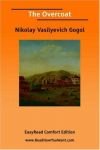
Since its publication in 1842, Dead Souls has been celebrated as a supremely realistic portrait of provincial Russian life and as a splendidly exaggerated tale; as a paean to the Russian spirit and as a remorseless satire of imperial Russian venality, vulgarity, and pomp. As Gogol's wily antihero, Chichikov, combs the …

Diary of a Madman is a farcical short story by Nikolai Gogol. Along with The Overcoat and The Nose, Diary of a Madman is considered to be one of Gogol's greatest short stories. The tale centers on the life of a minor civil servant during the repressive era of Nicholas I. Following the format of a diary, the story …

Diary of a Madman is a farcical short story by Nikolai Gogol. Along with The Overcoat and The Nose, Diary of a Madman is considered to be one of Gogol's greatest short stories. The tale centers on the life of a minor civil servant during the repressive era of Nicholas I. Following the format of a diary, the story …

"The Overcoat" is a short story by Ukrainian-born Russian author Nikolai Gogol, published in 1842. The story and its author have had great influence on Russian literature, as expressed in a quote attributed to Fyodor Dostoevsky: "We all come out from Gogol's 'Overcoat'." The story has been adapted into a variety of …

When a barber finds the nose of one of his clients in a loaf of bread baked by his wife, strange events ensue as the client tries to get his nose back.

Considered the high point of Gogol's writing for the stage and a masterpiece of dramatic satire, The Inspector General skewers the stupidity, greed, and venality of Russian provincial officials. When it is announced that the Inspector General is coming to visit incognito, Anton, the chief of police, hastens to clean …

Taras Bulba is a romanticized historical novella by Nikolai Gogol. It describes the life of an old Zaporozhian Cossack, Taras Bulba, and his two sons, Andriy and Ostap. The sons study at the Kiev Academy and then return home, whereupon the three men set out on a journey to Zaporizhian Sich located in Southern Ukraine, …

 English
English Español
Español Deutsch
Deutsch


